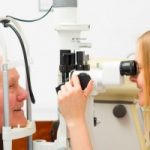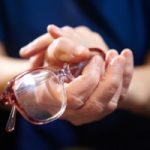 There are many common age-related vision problems that develop over time: presbyopia (farsightedness), cataracts and macular degeneration are just some examples. Although we may accept these vision changes, steps can be taken to prevent them and maintain healthy vision throughout the years.
There are many common age-related vision problems that develop over time: presbyopia (farsightedness), cataracts and macular degeneration are just some examples. Although we may accept these vision changes, steps can be taken to prevent them and maintain healthy vision throughout the years.
Our eyes are the windows to our soul. They allow us to see all the wonders around us. But when our eyes begin to age, our ability to see those wonders begins to fade. Taking good care of your eyes is the most important step you can take to ensure a lifetime of vision.
What is presbyopia?
Advertisement
 Presbyopia is an age-related vision problem that affects the ability to quickly focus on any objects close up. To understand what this means, it’s important to know how the eyes work.
Presbyopia is an age-related vision problem that affects the ability to quickly focus on any objects close up. To understand what this means, it’s important to know how the eyes work.
Light enters the eye through the cornea and passes through the pupil. The colored portion of your eye – or the iris – opens and closes the pupil to allow in the appropriate amount of light. This light is filtered through the lens. The lens will then change shape to bend the rays of light onto the retina – this is located at the back of the eye. This is how we see and focus on images.
With aging, the lens has a harder time bending and changing shape because it becomes weak. This slower motion results in an inability to focus on objects close up. Images then may appear blurry.
You may find you have to start standing further back from objects, or holding them further from your line of vision. This may be annoying but can easily be fixed with corrective lenses – or in extreme cases, surgery.
Risk factors of presbyopia
Because presbyopia is an age-related vision problem you may begin to notice it as early as your 40s. Anyone can develop presbyopia, but certain risk factors can speed up the condition. Some risk factors involve underlying medical conditions such as diabetes, cardiovascular disease, multiple sclerosis, eye trauma and poor blood flow.
Lifestyle factors can also increase one’s risk of developing presbyopia. For example, poor diet, alcohol consumption and living close to the equator all effect vision. You may not think the latter has anything to do with your vision but it does. Living closer to the equator exposes your eyes to more ultraviolet radiation, which can speed up presbyopia.
Related reading: Seniors: Your vision is at risk of this…
Symptoms of presbyopia
 Aside from having a harder time focusing on close objects, symptoms of presbyopia include:
Aside from having a harder time focusing on close objects, symptoms of presbyopia include:
- Eyestrain from working
- Headaches caused by eyestrain
- Fatigue
- Requiring more light when working on a project or reading
- Distancing objects from your eyes
- Squinting
Presbyopia can often be confused with hyperopia. Symptoms appear to be the same, but hyperopia starts at birth when the eye is too flat, causing focusing issues.
Causes of presbyopia
Although the main cause of presbyopia is aging, it’s important to understand what exactly is happening that is causing vision problems.
Through aging the mechanisms in our eyes become weaker and, in particular, the lens begins to harden. Less flexibility in the lens leads to unfocused light reaching the retina, which results in blurry close-up vision.
Natural remedies for presbyopia
 You may think that presbyopia is inevitable because it is a result of aging, but you can help maintain healthy vision by using these natural remedies.
You may think that presbyopia is inevitable because it is a result of aging, but you can help maintain healthy vision by using these natural remedies.
Eye exercises: Did you know, just like the rest of your body, your eyes need exercise to stay healthy? It’s true. Luckily, there are easy eye exercises that can help fight against presbyopia.
One technique involves crossing your eyes and focusing on the tip of your nose. Focus on the tip of your nose, turn your gaze to a faraway object, and then return your focus back to the tip of your nose. Keep the narrow focus as long as it takes you to inhale a breath and switch to the further object when your exhale.
Another helpful eye exercise is to hold written text about three inches away from your eyes. Hold the text upside down and gaze around each letter in each word.
Diet: Food can be a powerful source of eye-friendly nutrients. Enjoying a diet rich in eye nutrients can help boost eye health and deter the effects of presbyopia. They don’t tell you to eat your carrots for no reason.
Get regular eye exams: You’ll never know how bad or good your vision is until you get your eyes checked out. Just like your annual physical, you should always remember to schedule regular eye exams to track the progress of your vision. Furthermore, this allows you to keep your prescription up-to-date so you don’t have to regress to headaches and squinting again.
Rest your eyes: Just like how your body gets tired, your eyes get tired, too. Allowing your eyes to rest is essential for good eyesight. If you work in front of a computer all day, close your eyes for a few short moments, then open and re-focus. Another helpful tip is to move your gaze. Switch between something close up and something far in the distance – similar to the recommended eye exercises. Lastly, blinking is the number one way to rest your eyes, even for a split second. Blinking adds lubrication and keeps eyes moist.
Get proper sleep: Also related to eye rest is getting a good night’s sleep. How you sleep can affect your eyesight as well. If you’re tossing, turning and staring at the ceiling all night, your eyes can grow tired and become quite irritated. Lack of sleep can also hinder the ability for your eyes to focus.
Advertisement
Use proper eye care: Just like your body, if you put something in your eyes that they don’t like, they won’t work properly. Avoid sticking fingers in your eyes, and if you have to rub your eyes, ensure your hands are clean. Washing your eyes or even applying warm compresses can also help. And if you’re a person who wears make-up, be careful of mascara wands and eyeliner pencils. They can carry bacteria, so ensure you are cleaning those products to avoid putting harmful germs into your eyes.
These are some easy natural remedies for presbyopia and overall eye care. You don’t have to accept presbyopia as a normal part of aging. You can take the necessary steps to keep your eyes strong. As a start, ensure you’re not overworking your eyes and feed them the right nutrients.
We only have one set of eyes, and although medical intervention may help preserve them, we should try our best to utilize natural remedies to keep them healthy and strong.
